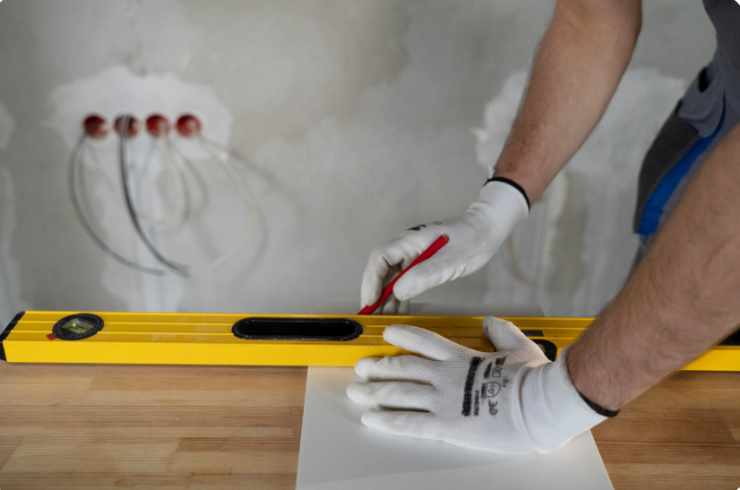Post Construction Cleaning Services: Make Your Space Move-In Ready
Construction projects create extensive dust, debris, and residue that standard cleaning methods cannot address adequately. Post construction cleaning services specialize...

Construction projects require meticulous attention to detail during final phases to deliver professional, polished results. Finishing services encompass the specialized work that changes rough construction into completed, functional spaces. These services ensure projects meet quality standards while addressing the small details that determine overall satisfaction and performance.
Interior finishing services include flooring installation, paint application, trim work, and fixture installation that complete interior spaces. Interior finishing changes framed structures into functional, attractive environments ready for occupancy. Quality interior finishing affects both appearance and long-term performance of building systems.
Exterior finishing services encompass siding, roofing details, exterior trim, and weatherproofing applications that protect buildings while creating attractive appearances. Exterior finishing provides weather protection and curb appeal that affects property values. Professional exterior finishing ensures buildings withstand environmental conditions while maintaining appearance.
Specialty finishing services address project requirements like custom millwork, decorative elements, and high-end fixtures that distinguish properties from standard construction. Specialty work requires skilled craftsmen who understand traditional techniques and modern applications. Specialty finishing adds character and value to construction projects.
Surface preparation ensures finishing materials adhere properly and provide long-lasting performance. Inadequate preparation leads to finish failures that require expensive corrections later. Professional surface preparation includes cleaning, priming, and defect repair before final applications.
Material application follows manufacturer specifications and industry best practices to achieve intended performance and appearance. Improper application techniques can cause finish failures even with quality materials. Professional application ensures finishes perform as intended while maintaining warranty coverage.
Inspection procedures identify defects and deficiencies requiring correction before project completion. Systematic inspections catch problems while they can be corrected efficiently and cost-effectively. Quality inspections ensure finishing work meets standards and customer expectations.
Hardwood flooring installation requires precise measuring, cutting, and fastening techniques to achieve professional results. Improper installation can cause gaps, squeaks, and premature wear that compromise appearance and performance. Professional hardwood installation ensures beautiful, long-lasting floors.
Tile and stone installation demands attention to layout, adhesive application, and grout work to create attractive, durable surfaces. Poor tile work is immediately obvious and difficult to correct after installation. Professional tile installation delivers surfaces that maintain appearance and performance for decades.
Carpet installation requires proper stretching, seaming, and trimming techniques to achieve smooth, professional appearances. Inadequate carpet installation causes premature wear and unsightly wrinkles that affect room appearance. Professional installation ensures carpets look and perform their best.
Wall preparation addresses surface defects, holes, and imperfections that would show through paint finishes. Proper preparation includes patching, sanding, and priming to create smooth surfaces ready for paint application. Quality preparation determines final paint appearance and longevity.
Paint application techniques affect both appearance and durability of finished surfaces throughout properties. Professional painters understand proper brush and roller techniques, spray application, and cutting methods. Quality paint application delivers smooth, even finishes that maintain appearance over time.
Specialty finishes include faux techniques, textures, and decorative applications that create appearances. Specialty work requires artistic skills and knowledge of specialized materials and techniques. Professional specialty finishing adds character and distinction to interior spaces.
Baseboard installation requires precise measuring, cutting, and fitting to create clean, professional transitions between walls and floors. Gaps and misaligned joints are immediately obvious and detract from overall finish quality. Professional baseboard installation delivers clean, attractive room perimeters.
Crown molding installation demands advanced carpentry skills to achieve tight joints and proper wall alignment. Crown molding installation requires knowledge of angles, coping techniques, and fastening methods. Professional crown installation adds elegance and visual interest to interior spaces.
Custom millwork installation includes built-in cabinets, shelving, and architectural details that require precise fitting and finishing. Custom work requires advanced woodworking skills and attention to detail. Professional millwork installation creates functional, attractive features that add property value.
Lighting fixture installation requires electrical knowledge and careful attention to mounting and alignment for both function and appearance. Improper fixture installation can create safety hazards and detract from lighting effectiveness. Professional installation ensures fixtures operate safely while providing intended illumination.
Plumbing fixture installation involves connections to water supply and drain systems plus proper mounting and sealing. Fixture installation requires knowledge of plumbing codes and proper installation techniques. Professional installation ensures fixtures function properly without leaks or performance problems.
Cabinet hardware installation includes handles, hinges, and drawer slides that affect both function and appearance. Hardware must be precisely aligned and securely fastened to provide smooth operation. Professional hardware installation ensures cabinets function properly while maintaining attractive appearances.
Punch list management identifies and addresses all remaining items requiring attention before project completion. Systematic punch list procedures ensure nothing is overlooked during final project phases. Professional punch list management prevents delays and ensures complete project delivery.
Client walkthrough procedures allow customers to identify concerns and verify work meets expectations before final acceptance. Thorough walkthroughs prevent disputes and ensure customer satisfaction with finished projects. Professional walkthrough procedures demonstrate commitment to quality and customer service.
Warranty documentation provides customers with information about coverage for materials and workmanship after project completion. Clear warranty terms establish expectations and provide recourse if problems develop. Professional warranty documentation protects both customers and contractors.
Budget allocation ensures adequate resources are available for quality finishing work that affects overall project success. Inadequate finishing budgets lead to shortcuts that compromise project quality and customer satisfaction. Proper budget planning ensures finishing work meets quality expectations.
Change management procedures handle modifications and upgrades that commonly occur during finishing phases. Changes must be documented and priced fairly to prevent disputes and cost overruns. Professional change management maintains project control while accommodating customer needs.
Value engineering identifies opportunities to achieve desired results while controlling costs through material selection and installation methods. Value engineering balances cost and quality considerations to optimize project outcomes. Professional value engineering delivers maximum value within budget constraints.